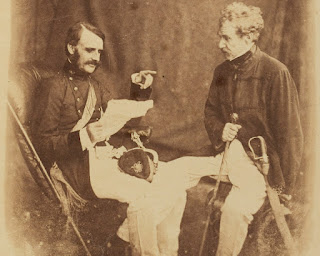During the1857 first War of Independence in India against English company's misrule, the British army produced many butchers like John Nicholson, Colonel James Neil, William Stephen Raikes Hodson and others. Among them was Field Marshal Colin Campbell, 1st Baron Clyde who had played no less role than others in the siege of Lucknow and other places.
 |
| Lord Colin (Campbell) en.wikipedia.org |
Field Marshal Colin Campbell, 1st Baron Clyde, KSI (20 October 1792 – 14 August 1863), son of a Glasgow carpenter was a British Army officer in 1812 and rose to various positions of prominence through innate skill, courage and unique war strategies, His active participation in the Peninsular war, the Second Anglo-Sikh War in which he led the 98th Regiment of Foot gave him lots of experience and confidence, Soon after that he played a commendable role during the Crimean War. After his brief sojourn in England, when the first war of Indian independence of 1857 had affected the morale of the British forces in India, on 1 July 1857, at an early stage in the Indian Mutiny, Lord Palmerston offered Campbell the command of all British forces in India and promoted to the local rank of full general in India. He landed in Calcutta, India in August 1857 to tackle the fast brewing violent revolt in northern states. With skill and tactics he then evacuated Lucknow in November 1857 and , defeated Tantia Tope at the Second Battle of Cawnpore in December 1857.
 |
| Campbell with Chief of Staff, Maj-Gen. William Mansfield,1858 nam.ac.uk |
He had a tough time at Lucknow with the rebels who controlled the city. The Begum Kothi palace complex was a tougher nut to break in. .Campbell resorted to blasting through several buildings for 3 long days capturing the rebel posts. The rebel casualty was way high. .more than 700 (official figure). Upon recapturing Lucknow again in March 1858, .he was promoted to the substantive rank of full general on 14 May 1858 later raised to the peerage as Baron Clyde, of Clydesdale in Scotland on 3 August 1858.
In Autumn 1858, faced with an unexpected hurdle - White Mutiny by the East India Company's European troops, who had not received their enlistment bounties, So, without hesitation, he used British troops to enforce discipline until the British Cabinet agreed to some concessions. While still commander-in-chief, he dealt with the "White Mutiny" carefully and sen it east in the Second Opium War. With full force under the control, his stern and fearsome actions helped him put down many parts of the mutiny. He continued in charge of the operations in India until the revolt was put down in 1858 and then returned to England in June 1860.
 |
| Field Marshal Colin Campbell.alamy.com/, |








.jpeg)
